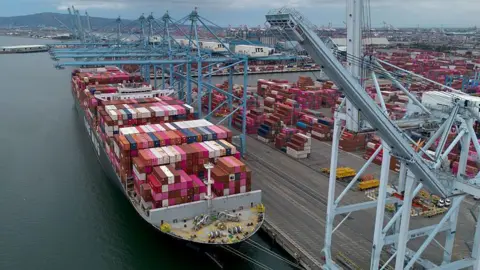**US and China Set to Meet for Trade Talks in London**
A significant new round of negotiations aimed at alleviating the ongoing trade war between the United States and China is set to unfold in London, commencing on Monday. This engagement represents a critical moment as both nations grapple with the complexities of their economic relationship and try to navigate a path toward resolution.
US President Donald Trump made a pivotal announcement on Friday stating that a senior delegation from the United States would be meeting with Chinese representatives. In a parallel development, Beijing confirmed that Vice Premier He Lifeng would represent China at these talks. The backdrop of this meeting hinges on a recent conversation between Trump and Chinese President Xi Jinping, wherein Trump characterized the dialogue as “very good,” suggesting a hopeful tone for the forthcoming negotiations.
The mutual interest in these discussions arose following a temporary truce agreed upon last month, which aimed to lower import tariffs on goods exchanged between the two nations. However, both the US and China have since leveled accusations against each other, claiming breaches of this fragile agreement, which is now under increasing strain.
In a more detailed account provided through his social media platform, Truth Social, Trump revealed that key members of his administration would be attending the London talks. Specifically, US Treasury Secretary Scott Bessent, Commerce Secretary Howard Lutnick, and Trade Representative Jamieson Greer are all set to engage with Chinese officials to deliberate on the complexities of current trade relations.
Beijing’s Ministry of Foreign Affairs further elaborated on the Vice Premier’s itinerary, indicating that He Lifeng would be in the UK from June 8 to June 13, and that the meetings would focus on the established “China-US economic and trade mechanism.” These preparations follow an encouraging phone conversation between Trump and Xi, which was reportedly concentrated on trade matters and led to a “very positive conclusion” for both countries.
However, the relationship has shown signs of deterioration in the backdrop of recent events. Trump expressed disappointment last month, declaring that China “totally violated” their agreement, while soon after, Chinese officials reciprocated by criticizing the US for a “severe violation” as well. This tit-for-tat exchange has only heightened tensions, with the US accusing China of failing to resume shipments of critical minerals essential for various industries, including automotive and technology sectors.
In an interesting development, the Chinese Ministry of Commerce announced approval for certain applications related to rare earth export licenses, although specifics about the recipient countries were not disclosed. This announcement coincided with Trump’s claims that Xi had agreed to resume trade concerning rare earth materials—a vital component for the US’s technological and automotive industries.
White House National Economic Council Director, Kevin Hassett, acknowledged in a recent CBS News interview that while the exports of critical minerals from China had seen an increase, they did not reach the levels that were informally understood during negotiations in Geneva.
As the two largest economies in the world prepare to engage in this crucial dialogue in London, the stakes are high. Both nations wrestle with the pressing need for a resolution to the ongoing trade discrepancies while managing their global economic positions. With the complicated history of exchanges between their leaders, the outcomes of the forthcoming meetings will likely influence not only bilateral trade dynamics but also broader global market trends.
Through patience and persistent dialogue, analysts and policymakers will watch closely to see if this latest round of discussions yields a decisive breakthrough that could set the stage for more stable economic relations in the years to come.



